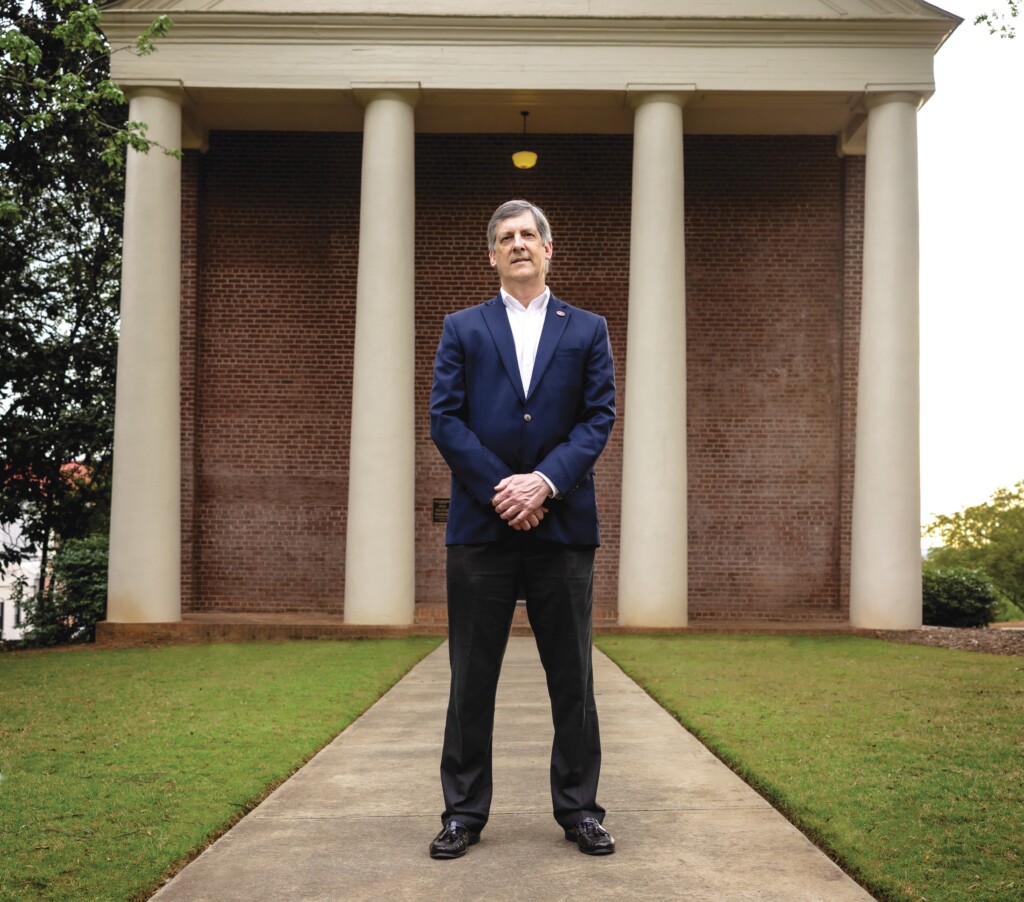AI: The Next Frontier
Georgia companies and universities are taking advantage of the many ways AI can bolster business, innovation and research.
AI – Artificial Intelligence – has the potential to transfigure business. Or cost millions of jobs. Or make us all more productive. Or pose an existential threat (according to one letter signed by heavy hitters in the AI world).
Or…maybe it’s “and” – AI has the potential to do all that, depending on how we use it.
“Companies who embrace humans plus machines will have a leg up on their competitors. Generative AI can be a game changer that will transform business as we know it, and businesses that can figure out how to work with machines the quickest will win the race,” says David Leiter, KPMG’s Atlanta office managing partner.
AI has taken over the national conversation since Open AI’s ChatGPT, a type of AI called generative AI, seemed to burst on the scene in November 2022. But AI isn’t quite that new. Businesses have been using traditional AI for decades, especially to automate tasks and perform predictive maintenance.
The term was first used in 1955 and encompasses everything from machines capable of thought to algorithms Google uses to serve up search results. It’s used routinely in healthcare, advanced manufacturing, customer service (ever chatted with a bot?) and even in recruiting (where your résumé is scanned by applicant tracking software and passed on to a human or rejected right there). Amazon uses AI to make its recommendations about things you might want to put in your cart. In fact, you can just ask Alexa to get it for you, and it will serve as your own personal AI.
What’s new is generative AI, technology that can ingest a vast amount of raw data – like, say, everything on the web – and then create (or generate) images, speech, text and other content.
Georgia companies large and small are eager to employ generative AI, including startups as well as some of the most established firms.
“I think just about every client we have is looking at how they can leverage AI in what they do, and to provide a better experience for their employees,” Leiter says. “AI is also becoming a core skill set for all of our professionals in KPMG.” The global professional services company expects AI to have a transformative effect on corporate tax departments and is making major investments to meet client needs.
In Georgia, the firm offers companies guidance on developing use cases for AI, building governance and strategy frameworks, developing proofs of concept, and selecting vendors for AI systems. Its 22,000-square-foot Ignition Center in Atlanta – one of only six in the country – provides a showcase.
“Leaders across the state should be focused on how AI will change or evolve the scope and skills of their workforce. There are still hurdles to consider, and from a leadership perspective, it is critical that organizations empower the right people to steer their adoption of AI technologies,” Leiter says.
AI’s Vitality in Georgia
A number of startups in the state are focused on AI. Sema4.ai, founded in November 2023, made a splashy debut when it announced it had garnered $30.5 million in venture capital funding. The company uses AI to help banks detect fraud. Another AI startup, Athens-based Vertice AI, which won the Technology Association of Georgia’s 2023 Innovation Challenge, aims to help credit unions and community banks use their existing data to personalize recommendations about products and services to their customers. Cybersecurity startup Ironscales in Atlanta offers a suite of generative AI apps to stop phishing.
Salesloft, a sales engagement platform that helps sales teams increase outreach and conversions, is an example of a Georgia company that uses multiple types of AI and has updated its product offering to include generative AI for email marketing. The company was launched in 2011 and acquired by Vista Equity Partners for $2.3 billion in December 2021.
“We use proprietary AI, and sales professionals can do all their work out of our platform. Our generative AI also enables Salesloft to gather insights from customers and prospects and turn those insights into suggested actions to create certainty,” says interim CFO Chad Wonderling.
The growth of Georgia’s AI sector owes a lot to the backing of ATDC (Advanced Technology Development Center) at Georgia Tech, the state’s storied incubator for tech startups. Vertice AI is one of the companies that’s part of ATDC.
ATDC Director John Avery says AI reached an inflection point in the past year with generative AI focused on text and sees the next step as moving AI into the physical world, helped by a Georgia Artificial Intelligence in Manufacturing (Georgia AIM) grant. The Georgia AIM grant project, led by Georgia Tech’s Enterprise Innovation Institute, is funded by about $65 million in federal grant money intended to accelerate the adoption of AI in Georgia’s legacy industrial sectors.
Avery thinks the biggest growth area for AI will be in robotics, as well as automation, warehousing and distribution – sectors aligned with Georgia’s economic roots. Avery says implementing AI in the physical world is harder because it requires real-world data, which is more expensive than scraping the web for info that can be used to generate content, like ChatGPT does.
A vital ingredient in Georgia’s success in AI is its research universities, and many have created specialized hubs or institutes to coordinate and streamline the research, education and commercialization functions of each institution.
Georgia Tech alone has 200 faculty in research and education related to AI, while GTRI has 200 more and is still hiring, putting Tech ahead of most other universities nationwide, according to Irfan Essa, senior associate dean of computing and co-executive director of Tech’s new AI Hub.
The University of Georgia has the Institute for Artificial Intelligence within the Franklin College of Arts and Sciences and has created 70 new AI faculty positions to expand its capabilities. At Emory University, the new Center for AI Learning has been created to help drive the school’s AI Humanity initiative, deployed in fields where Emory is already strong and with a focus on ethics, says Joe Sutherland, the center’s inaugural director. At Georgia State University’s Robinson College of Business, the Center for Digital Innovation serves as an interdisciplinary research center that focuses on digital innovation, including AI, and promoting industry-university partnerships.
Training for the Future
Georgia, and especially Atlanta, may be well positioned to shape the future of AI to avoid a known risk: bias. Generative AI reflects the data it learns from, which at best suffers under-representation of socioeconomic, cultural, racial and gender differences (and at worst can reflect systemic racism and sexism). A Deloitte publication, “Opening doors of opportunity: AI as a vehicle for diversity and inclusion,” put it this way: “For AI to reach its full potential, it typically needs input from people with a diversity of backgrounds, lived experiences and real-world experience.”

Critical Thinking: Talitha Washington, director of the Atlanta University Center Data Science Initiative, photo Kevin Garrett.
Atlanta boasts a diverse workforce that already is a big draw for tech companies like Microsoft and Meta. And a number of initiatives are underway to increase diversity as the need for an AI-trained workforce explodes.
One goal of the GA-AIM coalition, which includes partners like Technical College System of Georgia, Spelman College and the Georgia Minority Business Development Agency, is to increase training and job opportunities in rural and historically underrepresented and underserved communities.
In Atlanta, Microsoft has programs to build AI skills in underserved communities, and Meta, working with Georgia Tech, has started the AI Learning Alliance to strengthen diversity.
The African American AI talent base certainly exists here, says Talitha Washington, inaugural director of the Atlanta University Center Data Science Initiative, funded by an $8.25 million investment by United Health Group.
Washington says the initiative is focusing on ways to upskill students to leverage AI and train them to be critical thinkers, with a clear understanding of the technology’s strengths and weaknesses. “There is a hunger to do more with AI to stay current,” she says.
Through a $6.5 million grant, Mastercard will help expand data science education and research in the nation’s Historically Black Colleges and Universities (HBCUs). Washington will lead the collaboration between Atlanta University and other HBCUs.
Washington says that Morehouse School of Medicine was selected to participate in the National Institutes of Health AIM-AHEAD program, an AI and machine learning consortium to advance health equity and researcher diversity.
Sam Altman, CEO of OpenAI, and John Hope Bryant, CEO of Atlanta-based Operation Hope, agreed in December to establish an AI Ethics Council to work with Atlanta HBCU leaders and other community members “to ensure all are protected and have the opportunity to participate in this new world of AI.”
“There’s a lot of risk in getting into the generative AI side to make the difference for our customers because there’s a lack of legislation. But there’s also a risk by not participating in it. We try to be very thoughtful about it.” Chad Wonderling, interim CFO, Salesloft
Keeping AI Safe
The pure power of generative AI has also raised fears about everything from bias to massive job losses to abuse of intellectual property.

“Education and Research: Mastercard’s Dawn Boudin, Atlanta University Center (AUC) Data Science Initiative’s Eboni Dotson, Mastercard’s Shamina Singh, AUC’s Carolyn Rhodes, AUC’s Tommy Taylor Jr., Morehouse College’s Alfred Watkins, AUC’s Talitha Washington and Spelman College’s Lyrric Jackson stand by a display showcasing Mastercard’s grant to help Historically Black Colleges and Universities.
“There’s a lot of risk in getting into the generative AI side to make the difference for our customers because there’s a lack of legislation. But there’s also a risk by not participating in it. We try to be very thoughtful about it,” says Salesloft’s Wonderling. The company has developed security and privacy standards its 800 employees must follow in working with clients.
AI-related bills introduced in this year’s General Assembly would bar the use of AI in making certain healthcare insurance and public assistance decisions, protect against discrimination, make it a criminal offense to use deep fakes to interfere with an election, and require the Georgia Technology Authority to prepare annual reports on the use of AI by state agencies.
The Atlanta Regional Commission has already issued preliminary guidance for ARC employees on the use of generative AI and is working on a model code that local governments can adopt.
In October, President Biden issued an executive order that established new standards and guardrails for AI safety and security. The Georgia Senate Committees on Public Safety and Science and Technology have held joint hearings on what needs to be done in Georgia. Public Safety Chair John Albers says the aim is to follow the Biden rules in general but to modify them as needed for Georgia – with future modifications necessary as the technology evolves.
Albers has also cosponsored a resolution to create a permanent Senate study committee on AI.
“If Georgia is the No. 1 state for business, it has to be the No. 1 state for AI,” Albers says.










